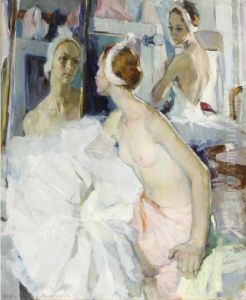Anton Semyonovich Makarenko Paintings
Anton Semyonovich Makarenko, a prominent Soviet educator and writer, was born on March 13, 1888, in Belopol, Russian Empire (now in Ukraine), and passed away on April 1, 1939, in Moscow, Soviet Union. Known for his innovative approaches to education, particularly within the context of reform schools for juvenile delinquents, Makarenko is considered one of the most influential educational theorists of the 20th century. His work in the Gorky Colony and later at the Dzerzhinsky Commune provided practical foundations to his theories, which emphasized collective responsibility, self-discipline, and the integration of work and learning into the educational process.
Makarenko's educational philosophy was deeply influenced by the political and social context of the early Soviet Union. He believed in the potential of every individual and the power of collective effort in personal and social development. Rejecting punitive measures, he instead focused on creating a structured environment where children could learn from their experiences, engage in productive labor, and participate in the governance of their communities. His methods were revolutionary at the time and have since been studied and implemented in various forms around the world.
Throughout his career, Makarenko wrote extensively about his experiences and theories. His most famous works, "The Pedagogical Poem" (also known as "The Road to Life"), a three-volume work, and "The Book for Parents", outline his educational methods and the philosophical principles underpinning his approach to upbringing and education. Despite facing criticism and opposition from some Soviet officials and contemporaries, Makarenko's ideas gained significant recognition and influence, both in the Soviet Union and internationally, particularly after his death. His contributions to educational theory and practice continue to be studied and celebrated, and his works remain an essential part of the curriculum in pedagogical institutions in Russia and beyond.
